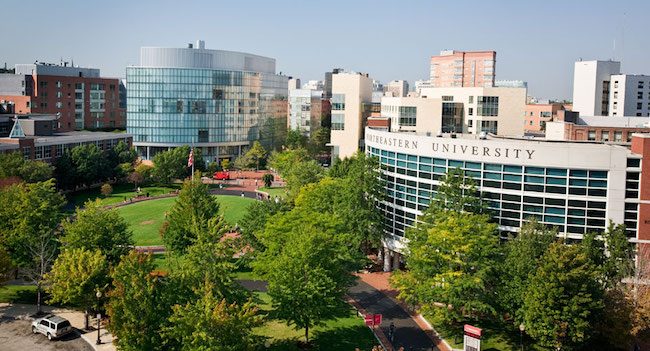
Northeastern University’s D’Amore-McKim School enrolled 31% international students last fall to lead all schools. Courtesy photo
For Tiffany Liew, a senior at Northeastern University’s D’Amore-McKim School of Business, there aren’t too many similarities between Boston and her hometown of Brunei, a small Southeast Asian nation on the island of Borneo.
But her transition to life in the U.S. was rather seamless. Part of that is due to the large international student population at Northeastern.
“Overall, given that there is such a large presence of international students at Northeastern and in the business school, this made the transition a lot easier as professors are used to having international students in the classroom,” Liew tells Poets&Quants for Undergrads.
This year, Northeastern University’s D’Amore-McKim School of Business enrolled more international students, at 31%, than all other B-schools in Poets&Quants‘ Best Undergraduate Business Schools ranking. Babson College came in second this year, with 24% of its incoming Fall 2018 class consisting of international students. New York University’s Stern School of Business and Rensselaer’s Lally School of Management tied for third with 23% to beat out last year’s third spot, Emory University’s Goizueta Business School, which fell back to sixth-most this year.
Schools that reported the least number of international students? Texas A&M University’s Mays Business School and the University of Pittsburgh both reported 1% enrollment of international students in their incoming Fall 2018 class. The University of New Hampshire’s Paul College of Business and Economics reported the lowest enrollment of international students at 0.5%. However, of the 88 schools ranked this year, 11 did not report international student populations.
Boston and the Northeast, in particular, are popular landing spots for international students. Three Boston area-based schools — Northeaster, Babson, and Boston University — were in the top five for international student enrollment this year. The other two schools in the top five — NYU Stern and Rensselaer Lally — are based in New York.
Business is inherently a global industry. And helping their students develop a global mindset is one of the main focuses at D’Amore-McKim.
“A class of 30 students can have as many as 10 or more countries represented, and lessons learned from each other are sometimes the most powerful and longest lasting,” Jeffery A. Born, associate dean of Undergraduate Programs at Northeastern’s D’Amore-McKim, says. “Based on our strategy, an internationally diverse student body just makes sense.”
International students, Born says, can offer unique perspectives that add to the classroom discussion and help to enhance students’ global mindset. At D’Amore-McKim, it’s not uncommon to be sitting in a class learning about foreign markets while a large percentage of the class is actually from those foreign markets. “Business on a global scale is a topic in almost every one of our classes, so having students from around the world share their experiences helps everyone,” Born adds.
That global mindset, Liew says, is an advantage for international students.
“Having a global mindset and being aware that there are other ways of doing things depending on which country you’re in or which cultures you’re dealing with is a great benefit for international students,” she says. “Additionally, comfort with relocating and being agile is another key benefit, in my opinion.”
A FIGHT FOR THE VALUABLE FOUR-YEAR DEGREE
Critics often say international students take up valuable seats at higher-education institutions that should belong to Americans.
Currently, the Trump administration is planning to set new time limits for student visas to decrease overstays. Under the current rule, according to Inside Higher Ed, student visas are valid for “duration of status,” which means international students can stay indefinitely in the U.S. as long as they can maintain their status as a student.
And while Northeastern officials say Trump’s aggressive policies haven’t yet impacted the school’s ability to attract international talent, a number of schools are feeling the effect. According to data released by the Institute of International Education, the number of international students enrolling at universities in the U.S. dropped nearly 7% in 2017.
The Institute found that international applicants cited the U.S. visa application process as the single biggest disincentive to apply to American universities. But a number of potential applicants also cited the political climate in the U.S., fear of safety, and cost as reasons not to apply, as reported by BBC.
Within our own data, many B-schools have also seen a year-over-year drop in international student numbers. Babson College, dropped from 28% for the incoming 2017 class to 24% this year. American University’s Kogod School of Business saw their percentage halved from 32% last year to 16% this year. Likewise, Emory dropped from 27% to 21.6%. However, schools like NYU Stern and the University of Pennsylvania’s Wharton School saw slight percentage increases compared to last year.
THE CASE FOR INTERNATIONAL STUDENTS
When asked how he would respond to critics of international students, Born says that business as an industry is only going to become more and more global by nature.
“If students are going into a business-related field, they need to be culturally agile, so having a diverse student body starts to prepare them for diverse experiences,” he reasons.
Another point of interest? International students represent a significant source of growth for the U.S. economy.
Last year, international students contributed nearly $39 billion to the U.S. economy, according to NAFSA. They also play a role in fueling innovation in the U.S. NAFSA reports that nearly one-quarter of the founders of the $1 billion U.S. startup companies first came to America as international students. Among that, Born says, international students play a key role in helping strengthen America’s global business ties.
“Alumni outside the U.S. are often in positions where they can encourage trade with or investments in the U.S. because of their intimate knowledge of U.S. firms through their co-op experiences,” he says.
NORTHEASTERN’S CO-OP PROGRAM IS THE NUMBER ONE ATTRACTOR FOR INTERNATIONAL STUDENTS
Born says both international students and domestic students are attracted to Northeastern’s D’Amore-McKim particularly for its strong co-op program. The program originally started in 1909 with eight engineering students and four Boston employers as an “earn-to-learn” program. Fast-forward to today and it’s become a cornerstone of the Northeastern education.
In the 2017-2018 academic year, more than 10,000 students at Northeastern completed a co-op work assignments with more than 2,500 hiring organizations in more than 46 states and 72 foreign countries. Participating companies range from Fortune 100 corporations to small startups in nearly every industry.
“Co-op was a huge factor that influenced my decision, as well as the physical location of the school being so central and easily accessible,” Liew points out. “I didn’t realize how global Northeastern was until I started as a freshman, but the global diversity is something that I really appreciate about the school and is something I often tell others as what I love about Northeastern.”
For Liew, the “challenges” of transitioning to the U.S. were rather small. Coming from a British education background, she says she had to get used to the GPA system and the American education system. But other than that, she says, she’s become quite accustomed to America.
“As an international student living here in Boston currently,” she says,” I have a had a very positive experience and this place now feels like home.”
(SEE THE NEXT PAGE FOR A LIST OF ALL 77 SCHOOLS THAT REPORTED INTERNATIONAL STUDENT DATA.)
The 2018 Special Report On Undergraduate Business Education
Ranking The Best Undergraduate Business Schools In The U.S.
How We Crunched The Numbers To Come Up With Our Ranking
2018 Report Card: How Business Majors Grade Their Own Undergraduate Programs
Acceptance Rates For The Best Undergraduate Business Programs
Average SAT Scores At The Top Undergraduate Business Schools
Best Business Schools For Landing A Job Right Out Of College












Questions about this article? Email us or leave a comment below.